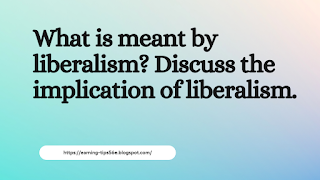 |
| What is meant by liberalism? Discuss the implication of liberalism. |
Liberalism is not only a doctrine , it may be regarded as a philosophy, an ideal, a movements, an attitude and a way of life. Liberalism may be defined as an idea committed to freedom as a method and policy in government, as an organising principle in society, and a way of life for the individual and the community.
Webster's Dictionary and Encyclopaedia defines: Liberalism as a term indicating the tendency towards extending individual rights and liberties as against rigid political, economic or bureaucratic authority. Politically the term was formerly used to denote a movement of progressive reform in government and has been applied at various times to parties agitating for the particular kind of liberty. Broadly speaking , Liberalism stands for the liberty of the individual, democratic institutions and free enterprise.
Hobhouse in his book Liberalism says the liberalism is the belief that society can be founded on the self-directing power of personality. It is only on this foundation that a true community can be built up. Liberty thus becomes not so much a right of the individual but as a necessity of society. Liberalism is a new ideology to fit the needs of new worlds.
Implication of Liberalism
In order to have an understanding of liberalism it is essential to discuss its implications in social, economic and political spheres.
In social context, liberalism stands for freedom from religious orthodoxy, it stands for secularism. The social aspect of liberalism has particular concern for individual's freedom in relation to religion and morality.
In the economic sphere, liberalism signifies free trade , free competition , freedom of production, private ownership of means of production, private property and right to earn profit.
In the political sphere, liberalism means securing freedom of thought, expression, belief, faith and religion supported by constitutional devices of parliamentary democracy, separation of powers, checks and balances, parliamentary control over executive, judicial review , protection of the right and interests of the minorities.
J.S. Mill accepted political and social freedom as the goal of liberalism .This is not because freedom contributes to an ulterior end, but because freedom is the proper condition needed for a responsible human being.



0 Comments